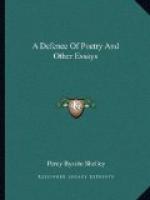The poetry of Dante may be considered as the bridge thrown over the stream of time, which unites the modern and ancient world. The distorted notions of invisible things which Dante and his rival Milton have idealized, are merely the mask and the mantle in which these great poets walk through eternity enveloped and disguised. It is a difficult question to determine how far they were conscious of the distinction which must have subsisted in their minds between their own creeds and that of the people. Dante at least appears to wish to mark the full extent of it by placing Riphaeus, whom Virgil calls justissimns unus, in Paradise, and observing a most heretical caprice in his distribution of rewards and punishments. And Milton’s poem contains within itself a philosophical refutation of that system, of which by a strange and natural antithesis, it has been a chief popular support. Nothing can exceed the energy and magnificence of the character of Satan as expressed in Paradise Lost. It is a mistake to suppose that he could ever have been intended for the popular personification of evil. Implacable hate, patient cunning, and a sleepless refinement of device to inflict the extremest anguish on an enemy, these things are evil; and, although venial in a slave are not to be forgiven in a tyrant; although redeemed by much that ennobles his defeat in one subdued, are marked by all that dishonours his conquest in the victor. Milton’s Devil as a moral being is as far superior to his God, as one who perseveres in some purpose which he has conceived to be excellent in spite of adversity and torture, is to one who in the cold security of undoubted triumph inflicts the most horrible revenge upon his enemy, not from any mistaken notion of inducing him to repent of a perseverance in enmity, but with the alleged design of exasperating him to deserve new torments. Milton has so far violated the popular creed (if this shall be judged




